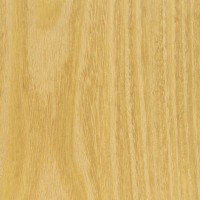 |
Common Name(s): Osage Orange, Horse Apple, Hedge Apple, Bois d’arc Scientific Name: Maclura pomifera Distribution: South-central United States Tree Size: 50-60 ft (15-18 m) tall, 1-2 ft (.3-.6 m) trunk diameter Average Dried Weight: 54 lbs/ft3 (855 kg/m3) Specific Gravity (Basic, 12% MC): .76, .86 Janka Hardness: 2,620 lbf (11,640 N) Modulus of Rupture: 18,650 lbf/in2 (128.6 MPa) Elastic Modulus: 1,689,000 lbf/in2 (11.64 GPa) Crushing Strength: 9,380 lbf/in2 (64.7 MPa)* *Estimated crushing strength from data of green wood at: 5,810 lbf/in2 (40.1 MPa) Shrinkage: Radial: 3.8%, Tangential: 5.6%, Volumetric: 9.2%, T/R Ratio: 1.5 |
Color/Appearance: Heartwood is golden to bright yellow, which inevitably ages to a darker medium brown with time: primarily due to exposure to ultraviolet light. See the article Preventing Color Changes in Exotic Woods for more details.
Grain/Texture: Grain is straight, with a fine to medium texture. High natural luster.
Endgrain: Ring-porous; large to very large earlywood pores 2-3 pores wide, small latewood pores in clusters and tangential bands; tyloses extremely abundant; growth rings distinct; narrow to medium rays visible without lens, spacing normal; parenchyma vasicentric, lozenge, and confluent.
Rot Resistance: Osage Orange is extremely durable and is considered to be one of the most decay resistant woods in North America.
Workability: Working this Osage Orange can be difficult due to its hardness and density, though it is reported to have little dulling effect on cutting edges. It turns well, and also takes stains, glues and finishes well.
Odor: No characteristic odor.
Allergies/Toxicity: Sap has been reported to cause dermatitis. See the articles Wood Allergies and Toxicity and Wood Dust Safety for more information.
Pricing/Availability: Having typically small, crooked, and knotty trunks, Osage Orange isn’t usually harvested for lumber, but can occasionally be found for sale in either board or small turning block form. Due to its domesticity and adequate supply, the price should be moderate, though likely to be higher than most other native lumbers on account of its “specialty” status.
Sustainability: This wood species is not listed in the CITES Appendices or on the IUCN Red List of Threatened Species.
Common Uses: Fence posts, dye, archery bows, musical instruments, turnings, and other small specialty wood items.
Comments: Osage Orange has a relatively low modulus of elasticity compared to its weight and modulus of rupture which helps explain why it is sometimes used for archery bows. It’s sometimes called Bois d’arc, which literally means “bow wood” in American French.The wood is also very stable, with little seasonal/environmental movement.
One helpful characteristic that can help separate it from lookalikes such as Mulberry or Black Locust (besides being heavier) is that Osage Orange contains a water-soluble yellow dye, so putting shavings into water will turn the water yellow.
Commonly, the wood of a related South-American species—Maclura tinctoria—is imported as Argentine Osage Orange. This imported wood has the advantage of being available in larger sizes, with boards having less knots and defects than the smaller domestic species, Maclura pomifera. (Though it appears, at least on paper, that Maclura pomifera has a lower modulus of elasticity, making it more flexible—which may be good or bad depending upon the intended application.)
Osage Orange has been shown in studies to produce more BTUs when burned than any other domestic hardwood, and is accordingly sometimes used as fuelwood.
Scans/Pictures: A special thanks to Steve Earis for providing the turned photo of this wood species.
 |
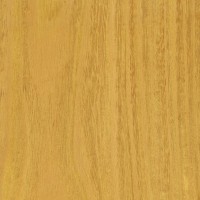 |
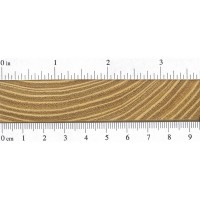 |
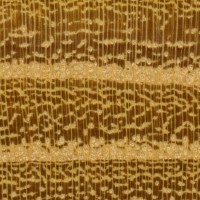 |
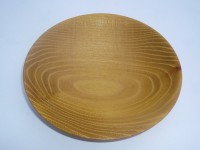 |


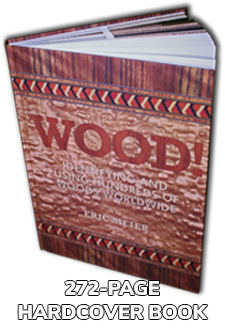


Stanley Tote
Flatsawn a 1 foot wide log. Slow growth Osage, lots of pores. Can’t say I’m a big fan of the porosity. One other drawback of Osage is it can be unstable when cut – checks appear out of thin air. However, the wood is strong enough that you can kind of just ignore the checks.
Next time I’m making a handle I would choose a faster growth Osage as those and less pores and this polish much more beautifully
Chatoyance is commonly seen, and most noticeable when sanded up to 2000+ grit and finished with tung oil
I made a Krenov-style block plane from a turning block and this is now my best wooden hand plane. I will probably make a larger one from another such block and wouldn’t even bother to glue a sole from another wood (I think the red one I used is some sort of macacauba or granadillo, but the woodworker buddy who gave it to me says it is purple heart) as one of the comments below says that when polished, osage orange is extremely slippery — exactly what you want on a hand plane sole! Here are two photos.
I made kitchen spatulas with it over twenty years ago and they’re still in great shape. I love it to smoke brisket.
Portafilter handle made out of a knotty section of Osage Orange. Chunks splinter really easily so I had to use a rasp to do final shaping
Wood easily takes fine polish without any additives.
I sanded this to 2000 grit with a tad bit of tung oil and it turned shiny and was able to be used right away.
Makes great magic wands – “Maclura Pomifera”! It even sounds like an incantation.
It truly does. I collect wooden wands and my Osage orange wand is most definitely my favorite. It has darkened to a delicious, warm orangey-brown over the years. It’s finished with just beeswax & mineral oil but it’s so smooth it feels almost like glass.
Picnic table I made from a hedge apple tree we harvested off of our property last spring. No stain, satin polyurethane only. It worked out great for a table and is as hard as concrete. The horizontal seating board is black walnut.
Thanks for the pics, this is great.
Wow!, that’s a great picnic table and it’s still going to be around for your great grandchildren, very nice build and an excellent use for hedge.
Knife handle Osage
This actually looks like either maple or beech. Osage orange doesn’t have those big flecks all over it. Here’s a letter opener made of osage as an example.
It is Argentine orange Osage.
That’s beech
Would like to see artwork made by anyone using Osage Orange or Bois D/Arc. It seems to have very beautiful grain but is difficult due to density. Also when drying the wood cracks as it is so sappy.
I have several Bois D’Arc trees on my land & have made several walking canes anticipating needing them in my old age. I’m now 87 & use them all the time to keep my balance. After it’s cut & cured, it’s too hard to cut with a knife. It can be ground with a grinder or a sander. It can be turned on a lathe. Staining it is like staining a piece of glass or stainless steel. In other words, you cannot stain it. I burned it with an acetylene torch then polished it with a polishing wheel on a… Read more »
Those are beautiful, I would love to have something like that for when I’m older. Currently 46 but do have bad knees from laying carpet.
The trees are common in my area but I have no woodworking skills.
I cleaned up the picture, couldn’t see the details.
They are really nice.
Hi guys,
As a self taught chainsaw-power carver and turner, I was ecstatic to be gifted with all the osage I could haul jusr outside Austin. Windthrown over 40 years ago and lived 40+ years. Researching prior to harvesting… i knew i would have to sharpen my saw on site. The wood is in amazing shape, almost no checking and it’s got the most beautiful flame.
Use a carbide chainsaw blade, they last much longer than normal blades. Would love to see what you are making. When you say beautiful flame are you talking about burning it? It can burn like the 4th of July when recently cut and it pops and sends different colored flames up.
Osage Orange burns so hot and pops so much that fire insurance is void if have a house fire from using it in a fireplace. However, it can be burned in a wood stove. It produces the highest BTU’s of any firewood.
My dad would throw one log in our Buck stove at night in winter, and that generated enough heat to help warm the house into the next morning.
Osage Orange has a special characteristic that is superior to any other wood I have ever worked. When planed and polished, it is very slippery, especially when slid across another piece of itself. This is likely due to its low silica content, which is in itself likely due to the low-silica gumbo soil in which it grows. Antique furniture nearly always has drawer slides that are severely worn. Usually they are made of soft wood like poplar or pine and can be worn down a half inch or more. The drawer bottoms are also often badly worn. On several pieces… Read more »
When should a feller cut branches or small trees? Is spring or fall? They cut my left leg off above the knee, a ways back. So, I figure on getting me a fancy cane.
Thanks for any feedback.
Cut in the late fall or winter if looking to do the least harm to the tree.
Thanks Mr Bsw.
Late fall to winter, when the trees are dormant is the best time to cut branches.
Thanks Mr Ian. I’m still going to grab 2 in the morning. I need a cane. But I’ll be back late fall. Thanks. I sure do appreciate it.
We have 5 bois d arc trees. 2 female and 3 male. I am 76 years of age. The trees were large when I was 6 years old. Lots of thorns on them on new growth, I trim any limbs or branches when they are head high so I don’t get stuck by the new growth. I trim back any time of the year. The only thing that seems to affect them is if they get blown completely over. Their roots are shallow. The circumference of one of my trees is 97 inches around near the middle. The bottom is… Read more »
I have a very large one on the ground. It blew over. Very hard wood to cut, so we will
probably burn it this fall. Bois d arcs burn hot and produce lots of sparks that reach very far out. Make sure surrounding area is cleared before burning.
Worked with Osage for the first time today. Holy moly was it tough to work with. Finished beautifully though!
The thorns are the best. Never seen a “thorn poke” swell so much so quickly.
Older bois d trees lose their thorns. Only the new growth produce thorns on my trees. I have lost two of them due to age in the last few years. They last years when they fall over. My two boys and their friends spent years playing on the fallen one in the woods behind my home. I have five left in my yard. They are very old and are beginning to produce new growth around the lower trunk, so I guess their days are numbered. The apples make beautiful star like decorations when you slice them. You slice them in… Read more »
How should you slice them? Horizontal to the stem end? Or vertical? And how think do you suggest? Thank you! We just bought a piece of midwestern property with several hedge apple trees.
I wonder if they have thorns when they’re young as a defense against some threat, maybe deer or something like that. Then once they’re older they’re no longer threatened, and the thorns become obsolete or not needed anymore/
I wish I had a lot more of osage orange. Perfect for my artwork.
Your work is truly beautiful, you can get all the Osage you want and for the most part free in Kansas. They use it for fence posts there and curved piece are burnt or thrown away.
That is amazing. Never seen anything like it.
That is truly beautiful! Do you remember what wood was used for each part? My Mum is dying to know what the legs are.
The legs look like black walnut heartwood. It has a beautiful chocolatey color. The sapwood is really light in color, which is what makes the heartwood more expensive.
This tree does NOT exist here in MN where I heat my home with wood. I am tempted to head south in my truck just to buy a full cord of this high BTU wood, mainly for fun. I’ve known about the heat it produces and want to try it out. It’s not about the money, time, or gas spent but simply the experience. Here in Mpls, the hottest wood we have is White Oak (quercus alba) and Shagbark Hickory.(dont know this one)
You should NOT use this in an open fireplace. Ever. This wood crackles and pops as it burns and can easily project glowing embers 5 to 6 feet. Screening is of limited use. Now, I understand you probably want to burn it in a tight wood stove. Ok. Be aware the this wood burns hot enough that I’ve seen even heavy welded boiler plate stoves (like Fishers and “Earth Stove”) both warp and break along weld lines. It is GREAT in a cast iron stove. But even then I advise co-loading it with other hardwoods. I have a Vermont Castings… Read more »
I was told by the guy that supplies my firewood that to properly season this wood it takes 10 years.
got it in ohio here and there…not an abundant amount but we have it.
I just received some mixed in with oak and maple here in NE Ohio. A friend has some trees on his property in Hartsgrove also
David Martin, here in Tennessee there is quite a bit of Osage. Most refer to it as Hedge Apple or just Hedge. I have burned quite a bit of it at different times over the years and my uncle has as well. I think the BTU rating is more of a scientific observation rather than something you can actually feel. We have burned it while setting around a camp fire, in a fireplace and in the wood burning stove. I’ve never noticed any difference in any situation but one. Where it really does shine is in our old wood cookstove… Read more »
Osage doesn’t make for good firewood, it’s extremely pitchy and creates mass amounts of creosote. it will destroy your chimney unless you have a stainless steel liner, 316 stainless or higher.
David Martin
Check out black locust, a non native (to MN) tree that has somewhat higher heat content wood than white oak or hickory… And which some might like removed from land it has taken over! It also is a bit denser, stiffer and tougher than hickory.
You would be lucky to find any in a stack of firewood.
The wood is almost impossible to split by hand.
Instead of popping apart where the maul tip strikes it barely even cracks the surface.
When you take a wedge and force it into the wood the split is tethered from one side to the other with wood fibers.
Crazy stuff.
Don’t do it unless you have a stainless steel liner in your chimney, this wood creates 3rd degree glaze.
I’m building a bass guitar with this wood as a neck. Hopefully it will prove stable like h the article describes.
I used it for a fretboard and it has held up fine. If you can find a straight grained piece, I think it would make a really nice neck.
Many homes that were built at the turn of the century (1890-1938 or so) in Dallas and fort Worth Texas are actually still sitting on foundation pilings that are made of this wood. It’s due to how the wood stays dry, is very dense and heavy, and is virtually impervious to both decay and termites. It’s like with age, the wood gets harder and harder so foundation pilings were actually a really good use of this wood back then…
In the early days of home loans and homeowners insurance in Hunt and Kaufman county, construction was dependent on the residence being constructed on bois d’arc piers to preclude termites and to minimize the damage of the black gumbo soil movement.
My grandfather built a barn in central Mississippi in 1914 on bois d’arc footings, and when a tornado damaged it beyond repair in 1990, the footings were still solid.
Reading through the comments and noticed a couple of comments talking about the osage orange fruit, or hedge apples, as we call them in Kentucky, being poisonous. I can tell you for sure they are not poisonous. They taste awful, but are not poisonous. Supposedly the fruit have anti cancer properties, and a lot of people claim to have been cured of cancer by ingesting the fruit. Google it, there is a ton of information about it on the internet.
I once found a web site that concluded hedge apples were not poisonous and at the same time showed that most of the sites or citations claiming they are poisonous came from a single source and there was no support for their claim.
Horses love the stuff, but foam at the mouth after eating it.
Texas people use the name bodark which is an obvious version of the Bois- Darc. Just learned that today when looking at some wood for sale in San Marcos Texas.
I use Osage for walking canes but have trouble keeping it from checking. More than any other wood. Any advice?
It is probably not thoroughly dried/cured before you start using it. Osage will let go of its water slowly. My advice would be to put a latex paint/glue or something to seal the ends. Let it dry for a couple months until the moisture content reaches equilibrium. Then clean up the ends and you should be good to go. Also, I will buy your Osage wood. It is ideal for my purposes but I do not have access:)
I would let it dry for more than a couple of months. I burn a lot of Hedge (what we call it here) wood in my fireplace. It is about 75% of what I burn. The rule of thumb for drying the wood enough to reduce the characteristic popping of the wood as it boils off the moisture and sap inside is to let it sit for at least nine months to one year. Cut the Hedge firewood in the winter before you want to burn it. And you will absolutely have to seal the ends. Even shorter sticks for… Read more »
I cut a very straight water spout from hedge. I guess the name applies to hedge, bo-dock, (franchise are soft on pronouncing R’s) etc. I put glue on both ends and stood it up in corner. two years later the bark was tight and it has no checking. Two days after cutting the glue off it started to check slightly so I sealed that with cyanoacrylate and fitted a .75″ copper cap to the foot. It’s still good 12 years later.
I agree with you Mike, a few months won’t do it. Set some aside and let a year or more pass. When that time is over, you’ll have some dry wood. If you live in a very humid place it’ll take longer. You can also take some wet would to one of those companies that specialize in kiln drying and then you’ll know for sure. IT is VERY hard to work with fully dry though so use a very sharp blade.
Split it with vedge on froe and keep the grains and growth rings as intact as possible.
Use cutting and sanding hand tools.
do all of your shaping when the wood is still wet, if that’s not an option then make a metal container to soak the wood in lemon oil, leave it for a week and bend it into any shape you want, leave that for at least a week and use a spoke shave to shape it however you want it to be.
Does anyone know the maximum MC per day loss in a kiln that Osage Orange will stand without splitting or checking?
I was curious as to why folks keep saying “checking”? Are y’all talking about cracking? We have a great many Osage trees growing on our Farm, and I may use it for crafts. Js
“Checking” is the term for the wood cracking at the ends where it was cut while it’s drying.
You should, hedge is a great teacher. Checking is the little squares you sometimes see in dry wood. There are ways to prevent that depending on your level of patience.
Once you’ve mastered Hedge you’ll be able to work with any other wood with ease.
My horses are stripping the bark off of my 2 younger trees. The first one is already dead. Any clues why they do this. I’ve had horses in this pasture for years With no problem. I thought it might be a mineral deficiency. I feed a daily mineral supplement plus round bales of jay.
In spite of the thorns, the leaves of bois d’arc are a huge favorite of our donkeys. Do you think they may be going for the sap? I do not observe them eating the bark, but my animals have a good bit of freedom to roam. Bored?
I think it’s most likely that the horses and donkeys are detecting the orange smell of the wood, and they love oranges…
They call em horse apples too…?
I wonder if that’s why the young trees have thorns.
I make end-grain cutting boards and am wondering how it would be for that purpose.
Should be good! Highly decay resistant and the hardness wears well against the onslaught of sharp blades.
Where can I find pockets of Osage growing on Vancouver Island?
I doubt Osage grows on Vancouver Island, I lived there for 10 years and never say any, probably your hardwood store could get you some. If so when you get it you’ll need to either use it for turning or you’ll need to soak of for a month to regain any elasticity.
Osage is my absolute favorite locally sourced, inexpensive turning wood. Fine grain is great fro ornamental turning as well.
Hi Ed,
Do you still have this vase turning?? If you want to sell it, please get in touch.
osagemann at yahoo dot com I must say,,,you are a very talented wood turner…
I make wooden kitchen utensils out of it and have since 2005
John
Osage Orange: 60#/Cu Ft; 4792#/cord; ~7000 Btu/lbs; 33,500,000 Btu/cord
Black Locust: 52#/Cu Ft; 4200#/cord; ~7000 Btu/lbs; 29,000,000 Btu/cord
Shagbark Hickory: 51#/Cu Ft; 4100#/cord; ~7000Btu/lbs; 28,400,000 Btu/cord
Ironwood
Dogwood
Honey Locust
White Oak: 47#/Cu Ft; 3800#/cord; ~7000 Btu/lbs; 26,400,00 Btu/cord
Blue Beech
Red Oak
Beech
White Ash
Hard Maple
Walnut
Black Cherry
This is a “sparkling” wood. NEVER burn it in an open fireplace or even campfire. Similar to burning acorns, it will “spit” embers out which can start furniture/rug fires. There should be no combustibles within 5 or more feet of an open fire.
I cut and burnt osage for years. Took out a fence line with one tree over 4 in diameter. Extremely old. Heaviest of all American woods. It should NOT be burnt in a fireplace but only in a coal rated stove. It doesn’t burn with the characteristic yellow flame but more like coal or gas with small blue flame. It will burn so hot that it will turn a black cast iron stove glowing red. Not recommended. Cutting a split should be done while green or freshly cut. Once it dries, especially after several years (this wood does NOT rot… Read more »
Why is Osage Orange (or Bois D’Arc as we call them in Oklahoma), always listed on the Janka Hardness test as being tested green?
It’s the only wood I’ve seen done this way.
I would guess that it’s because osage isn’t a commercial species, and it hasn’t been tested as extensively as the other hardwoods here in the US. Most of the data that people get (including myself) comes from tests done by the USDA, and nearly all of the sources only have information for the green wood.
With that being said, the Janka hardness value listed above on this page is for the DRIED wood at 12% MC. (The green value is listed at only 2040 lbf in Harry Alden’s “Hardwoods of North America.”)
For building or fencing applications it is so hard when dried, that it will not accept staples and it will bend nails, so fence with it when green and expect it to get harder as it ages.
Get a battery-powered drill with a 1/8 inch bit. Drill 2 holes 1/2 inch apart for your staple.
I burn boddock (osage) for heat and it burns longer and hotter than anything i’ve used. But not so good for a fireplace because it does a lot of popping.
I am new to this site, but i live in an area where there are a lot of these trees. I have also heard how people put these in their basements to ward off spiders. My dog recently died of canine dysautonomia (aka disautonomia) and I think somehow it has something to do with the toxicity of these hedge apples that are all over our property. This is just a theory of course and I have no way to prove it.
I know you posted the comment about your dog a few years ago but I wonder if it isn’t from mice rather than hedge balls. The mice that carry a terrible disease that can kill people just from the smell of their urine were found in the Midwest mostly. Dogs with the disease yours died of typically spend over 50% of their time outdoors and are located in the Midwest mostly. Hedge is in all of the US. I don’t want to doubt your hypothesis, just try to help give peace if you still live around these trees.
Have hedge wood for 50 years as firewood, fence posts and tool handles. Horses will chew the fruit ( apples) squirrels eat the seeds and the seeds inside the fruits are actually quite tasty. Insects and spiders will crawl over mashed and whole fruits without Ill effect. Some people have a mild skin reaction to the sap, but it is rare and negligible. Had a dog that would fetch hedge apples but he would not chew them. About a million farm and rural dogs have lived surrounded by hedge trees all their lives without Ill effect. Well besides the thorns… Read more »
I live near the lake in southwest Michigan and we have a good deal of Osage growing locally. It’s one of, if not the, hardest woods in the area, and my favorite to work with. My dad and I use it for all sorts of stuff. I carve a lot of tobacco pipes out of it as it’s a great hardwood for that. My dad is fond of using it on the lathe, making bowls, plates, and various thin-stemmed cups from it. The trees are rather gnarly and ugly as are the bumpy-green “oranges” that grow on them. My dad… Read more »
have built quite a few peaces of furniture with osage and find it good to wotk with but must caution that a moderate feed rate is needed or it will burn then you have fun sanding it out. the darkening dose not take that long and will occuse in or outside. sands nice and finishes very good with lacquer. try it when you find some you may just like the wood.
bob
Hello Jeremy: We sawed a couple of very green logs into lumber with a chainsaw lumber mill and had no trouble at all. Though, I would say that chain saws are in a different category. They are a law unto themselves. Once the planks were cut we ripped all “waste wood” off of the planks on a table saw. Again, we had no problems and it was easy going. I have also ripped, crosscut, and milled dried Osage and have had no trouble with power tools. One thing though,,,,,if you linger while cutting or milling as with a router, it… Read more »
Osage is not too hard to cut or work, cutting might be a little harder though but rasp, and sanding is a breez, I’ve been able to get glass like polishes on it. It’s one of my favorites, definitely my favorites to work.
Is Osage orange easier to cut green or dried? I’m carving a sign and its taking three times as long as it normally would.
I have been making rustic furniture with Osage for about 12 years. I use wood that has been dead for about 30 to 40 years. At that stage it is VERY hard. Work it green if you can. I clean the branches with a knotted wire brush with a flexible shaft and electric motor. It wears out the wire wheels. When the loose dead sapwood comes off the heartwood just starts to polish, the wheel won’t touch it.
Hi: I just wanted to answer and/or comment on some things mentioned above about Osage Orange. I have worked with it as turnery, and as cabinet wood, I have also used it after air-drying it for couple of years. It does warp if the log has much reaction wood in it. Unfortunately, most of these trees contain a lot of reaction wood! (The wood grown as the tree tries to compensate for a load, as in bending loads on a branch, for example.) However, once it has dried, it is quite stable (Even some reaction wood can be acceptably stable… Read more »
I own an old farm property in PA. There are many hedge trees on the boundaries. Many of them are in excess of 36 inches in diameter as they were planted more than 100 years ago. The limbs grew up in close proximity to each other (hedgerow) and are twisted and gnarled. As a young man I cut some in firewood length and stacked it on the ground 40 years ago. This year I kicked it loose and burned it in my wood furnace and I can tell you it was hard and dry and not a hint of rot.… Read more »
I don’t know if he’ll see it since his post is eight years old, but would like to thank Robert for taking the time/effort to put up such a thorough/knowledgeable post. Closer to present time, Bob please do update on here with your results. Bois d’arc is such a fascinating tree, not just because of the properties of the wood, but also it’s evolution and history. Definitely my favorite. I have seen a few trees like you describe, and the conditions were similar: crowded in a forest with other species. If we could figure out how to consistently get longer,… Read more »
Hi Bob, just wondering how you are making out with the Osage? Thanks.
I live near the lake in southwest Michigan and we have a good deal of Osage growing locally. It’s one of, if not the, hardest woods in the area, and my favorite to work with. My dad and I use it for all sorts of stuff. I carve a lot of tobacco pipes out of it as it’s a great hardwood for that. My dad is fond of using it on the lathe, making bowls, plates, and various thin-stemmed cups from it. The trees are rather gnarly and ugly as are the bumpy-green “oranges” that grow on them. My dad… Read more »
Hi I know this is an old post. I too am making tobacco pipes from this wood. Though I am only now starting in 2022. How many of the pipes are still being used that you produced. I am very excited to make more of these pipes in the future
Have you ever made any larger pieces with it? Like furniture?
we live in kentucky we call the tree’s hedge apple tree’s we use the fruit that fall’s from the tree to repel spider’s and other insects from our home and garage just put the fruit on reynolds wrap the more it rot’s the better it repel’s bugs it will last about six months the spyders will be gone.
Has anyone tried making bowls and such on a wood lathe from osage orange wood? It’s such a pretty wood… I wondered about the sealing of a bowl after it’s made…does polyeurthane work or should one use like a sealing spray? My boyfriend and I are working on making spoons to start with to see how they look. It does seem like a hard wood. I wonder how rare osage orange trees have become?
Does this Osage Orange Grow in BC
I have sevral very large hedge trees that i think that I am going to saw into lumber what is the best way to dry this type of lumber to keep it so that it can be used.
We call them hedgeapples as the trees are commonly known as hedge trees because they were planted in rows or hedges to stop wind erosion. They grow in low twisted branches but some do grow very tall. The hedge apples are not poisonous. The squirrels eat the seeds in the middle but most animals do not like them. There are supposed to repel insects like spiders, crickets, and roaches by placing in an area.
I picked a couple of the fruit from a tree that had fell from this tree which we always called Horse Apples and that they were poisonius and to not ever touch them. Why would our parents who went thru’the great depression in the 30’s tell us this and just what are they?
Help. . . .
Can anyone please tell me what the glueing properities of Osage Orange are?
Thanks, Bill
Are you looking for the compression strength parallel to the grain? If so, then this is the same thing as the “Crushing Strength” listed above. Otherwise, it’s compression strength *perpendicular* to the grain is listed as 2,260 lbs/in2 in its green state. (Might need to adjust these numbers to get a more accurate picture of how strong it will be when at 12% moisture.)
I am desperately in search for the compressive strength of osage orange. Can anybody give me the number(s) ? Thank´s
Siegmar Siemers
I can also get small to medium pieces for turning. I also have access to a limited amount of 100 +year old fence posts that have been removed. Hedge when cut green into boards tends to twist and split as it dries. The old stuff will be dark brown the green a glorious flaming yellow. I have never seen logs already dried cut into boards as you will see sparks from your saw blade when cutting it. I have worked with several exotic woods famed for their hardness and hedge is at least as hard as them esp. that raised… Read more »